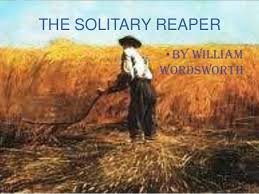The Solitary Reaper William Wordsworth (1770-1850)
The Solitary Reaper
William Wordsworth (1770-1850)
1st semester Foundation -English
BEHOLD her, single in the field,
Yon solitary Highland Lass!
Reaping and singing by herself;
Stop here, or gently pass!
Alone she cuts and binds the grain,
And sings a melancholy strain;
O listen! for the vale profound
Is overflowing with the sound.
No nightingale did ever chaunt
More welcome notes to weary bands
Of travelers in some shady haunt,
Among Arabian sands;
A voice so thrilling ne'er was heard
In spring-time from the cuckoo-bird,
Breaking the silence of the seas
Among the farthest Hebrides.
Will no one tell me what she sings?-
Perhaps the plaintive numbers flow
For old, unhappy far off things,
And battles long ago:
Or is it some more humble lay.
Familiar matter of to-day?
Some natural sorrow, loss, or pain,
That has been, and may be again?
Whate'er the theme, the maiden sang
As if her song could have no ending;
I saw her singing at her work;
And o'er the sickle bending;-
I listen'd, motionless and still;
And, as I mounted up the hill,
The music in my heart I bore,
Long after it was heard no more.
Wordsworth was born on 7th April' 1770 at Cockermouth in Cumberland. His father John Wordsworth was an attorney. One of the greatest poets of nature in English, Wordsworth was the pioneer of the Romantic Movement, along with Samuel Taylor Coleridge, in England. Lyrical Ballads, a collaborative anthology of poems by the two poets, stands as a signpost in the history of English Literature. Their breaking away from the tradition of English poetry of Neo- Classical forms and subject matters was outlined in the Preface to Lyrical Ballads (1798), considered to be the manifesto of English Romantic Poetry. During the first phase of his poetic career, Wordsworth's works are marked with a diction closely approximating the speech of everyday life, subjects being simply taken out from the humble, rustic life. In his compositions of later period Wordsworth developed a philosophical inclination where the presence of Nature, its objects and their relationship with man came to be celebrated as a kind of religion. In respect of the subject matters, his works are a mixture of realistic humanitarianism and a pagan and completely pantheistic worship of nature. Besides two great autographical poems, The Prelude and The Excursion, he made excellent use of elevated and impassioned language in Tintern Abbey & Ode on Imitation. His shorter poems and simpler lyrics are also quite popular.
The Solitary Reaper (An Outline and Observation):
The poet asks the passerby to notice the highland girl working lonely in the field. She is singing some melancholy strain while cutting and binding the grain. The whole valley is overflowed with the musical impact of the
song. The poet says, no nightingale has sung as sweetly, as this girl, to the tired travellers in the deserts of Arabia. The song is more thrilling than that of a cuckoo in the spring breaking the silence of the remotest Hebrides. He wants to know, what the subject matter of the song is. Probably she is singing a song of some probably old historic event or some famous battle; her song is mainly about some common sorrow and sufferings of ordinary life that afflict humanity time and again. Whatever be the subject of her song, the girl was singing quite rapturously. The poet observes her working and bending over the sickle, and her sweet melody echoed in his heart long after the song was heard.

.jpg)
মন্তব্যসমূহ
একটি মন্তব্য পোস্ট করুন